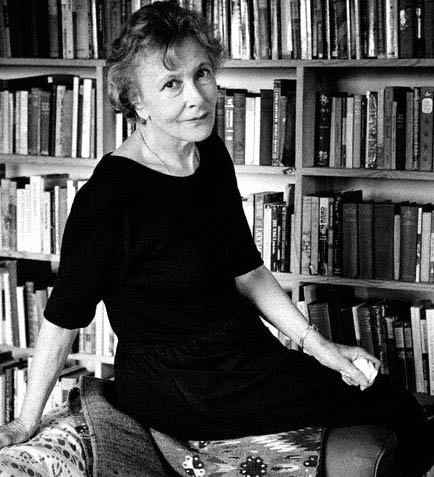 |
| Denise Levertov |
She wrote a number of poems about her opposition to this conflict and against war in general, especially in the volume The Sorrow Dance (1967) and The Freeing of the Dust (1975) and her progressive views on many different topics are evident in her poetry. Yet it is the poetry itself, limpid and lucid, proceeding often as if she were speaking but carefully shaped, full of internal music, that testifies to her importance in American letters. Levertov was born in the United Kingdom, however; her father was a Russian Jewish immigrant who converted to Christianity, and her mother was Welsh. She served as a nurse during World War II, and came to the US only in 1948, a year after marrying an American writer, Mitchell Goodman. From then on, through her affiliation with the Black Mountain writers, on to her final works, which include more personal and sometimes overtly confessional lyrics, she published regularly and to considerable recognition, while taking stands on behalf of women's liberation and civil rights, and teaching and mentoring younger writers, including at Stanford University from 1981 to 1994.
Here's one of her poems, "To the Reader," which gives a sense of how effortlessly profound she can be. At first, she contrasts the experience of the reader with an almost generic scene occurring somewhere in nature (which of course could be and is, ironically, a scene in this book), which quickly becomes much more specific and memorable with that "saffron" (note too the subtle, but effective music here, born of deftly deployed prosody, consonance and rhyme), and then in the second stanza, she shifts to a more ambigious scene--where is it taking place, described as it is with evocative lyric precision--"lie among lianas: eyes of obsidian"--and then, only in the final paragraph, do we get a metaphor, the sea turning the pages of its waves, like the reader of the book, the final repetition both mirroring the action of the reader and the sea, while also inverting the action through personification so that it's the sea's "dark pages" that now have agency, turning the pages, of life and time; the natural world is set into motion by the work of art, this poem. Of course analogically these shifts are akin to what reading offers, what a good book, a great poem, can do: leaps of all kinds are possible, not just between stanzas, but between words, images, metaphors, or, as is the case here, metonyms and images, activating the world and life itself. I do hope readers turn to her from time to time; there is much to gain from doing so, and much to love.
TO THE READER As you read, a white bear leisurely pees, dyeing the snow saffron, and as you read, many gods lie among lianas: eyes of obsidian are watching the generations of leaves, and as you read the sea is turning its dark pages, turning its dark pages.
Copyright © Denise Levertov, "To the Reader," from The Jacob's Ladder, London: Jonathan Cape, 1965. All rights reserved.









I really like her work, though I haven't read it extensively. 'Come Into Animal Presence' is one of my favourite poems. I agree that she doesn't seem to be much studied these days, though.
ReplyDeleteI remember when she died, and what a tremor it sent through some poetry communities. You are right tho - she's in need of a renaissance
ReplyDeleteI was lucky enough to attend a reading she gave in Boston in late 1970 or early 1971, and she signed the book in which "To the Reader" serves as preface. I have four of her volumes, though I'm afraid they're boxed up somewhere in my attic or basement. She was as graceful in her person as she is in her poetry.
ReplyDelete